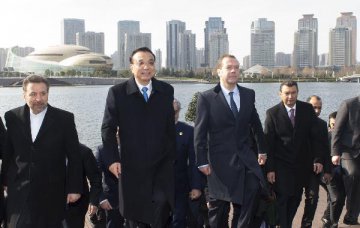
Chinese President Xi Jinping has put forward a five-point proposal Friday for the Shanghai Cooperation Organization (SCO) to consolidate unity and mutual trust, and deepen comprehensive cooperation.
Speaking at the 16th SCO Council of Heads of State meeting in Uzbek capital Tashkent, Xi hailed the remarkable achievements of the regional bloc since its establishment 15 years ago.
The first of the achievements is that the SCO has advocated and put into practice the pioneering Shanghai Spirit, which features mutual trust, mutual benefit, equality, consultation, respect for diverse civilizations and pursuit of common development, said the Chinese president.
Moreover, Xi noted that members of the SCO have worked to build political mutual trust and firmly supported each other's independent choices of development path. The SCO countries have also deepened their cooperation greatly in trade, business, finance, energy and transportation, among others areas, Xi said.
The SCO has signed the Treaty of Long-Term Good-Neighborliness, Friendship and Cooperation between the Shanghai Cooperation Organization, codifying into law the aspiration for enduring friendship.
In addition, the Chinese president noted, the organization has actively reached out to others with an ever-growing circle of friends. As last year's Ufa summit initiated the process to take in new members for the first time in the SCO history, the international influence of the organization has kept increasing with the organization's full members and observers accounting for nearly half of the world's population.
Proposing for future development of the SCO, Xi urged all members to firstly carry forward the Shanghai Spirit, which has been regarded as the bloc's undergirding value. Secondly, the SCO should prioritize security and cement this foundation of the SCO development, said the Chinese leader.
Thirdly, the SCO should expand practical cooperation and broaden the path for its progress. Fourthly, it also needs to enhance culture and people-to-people foundation as a bridge for future development, Xi said.
Last but not the least, the SCO should uphold openness and inclusiveness and get more parties on board for SCO cooperation, he said. The annual summit, hosted by Uzbek President Islam Karimov, was also attended by Kazakh President Nursultan Nazarbayev, Kyrgyz President Almazbek Atambayev, Russian President Vladimir Putin and Tajik President Emomali Rahmon.
The heads of state agreed that the next SCO summit will be held in Kazakhstan's capital Astana as Kazakhstan will take over the SCO rotating presidency from Uzbekistan.
They signed the Tashkent declaration on the 15th anniversary of the establishment of the SCO as well as several resolutions to approve an action plan of the SCO development in next five years, and the working reports of the SCO secretary-general and the organization's anti-terrorism institution.
The leaders also witnessed the signing of the memorandums of obligations for India and Pakistan to join the SCO, which is a key step for the two countries to obtain membership of the organization.
Founded in 2001, the SCO has six full members, namely China, Kazakhstan, Kyrgyzstan, Russia, Tajikistan and Uzbekistan, and six observers -- Afghanistan, Belarus, India, Iran, Mongolia and Pakistan.



















Latest comments